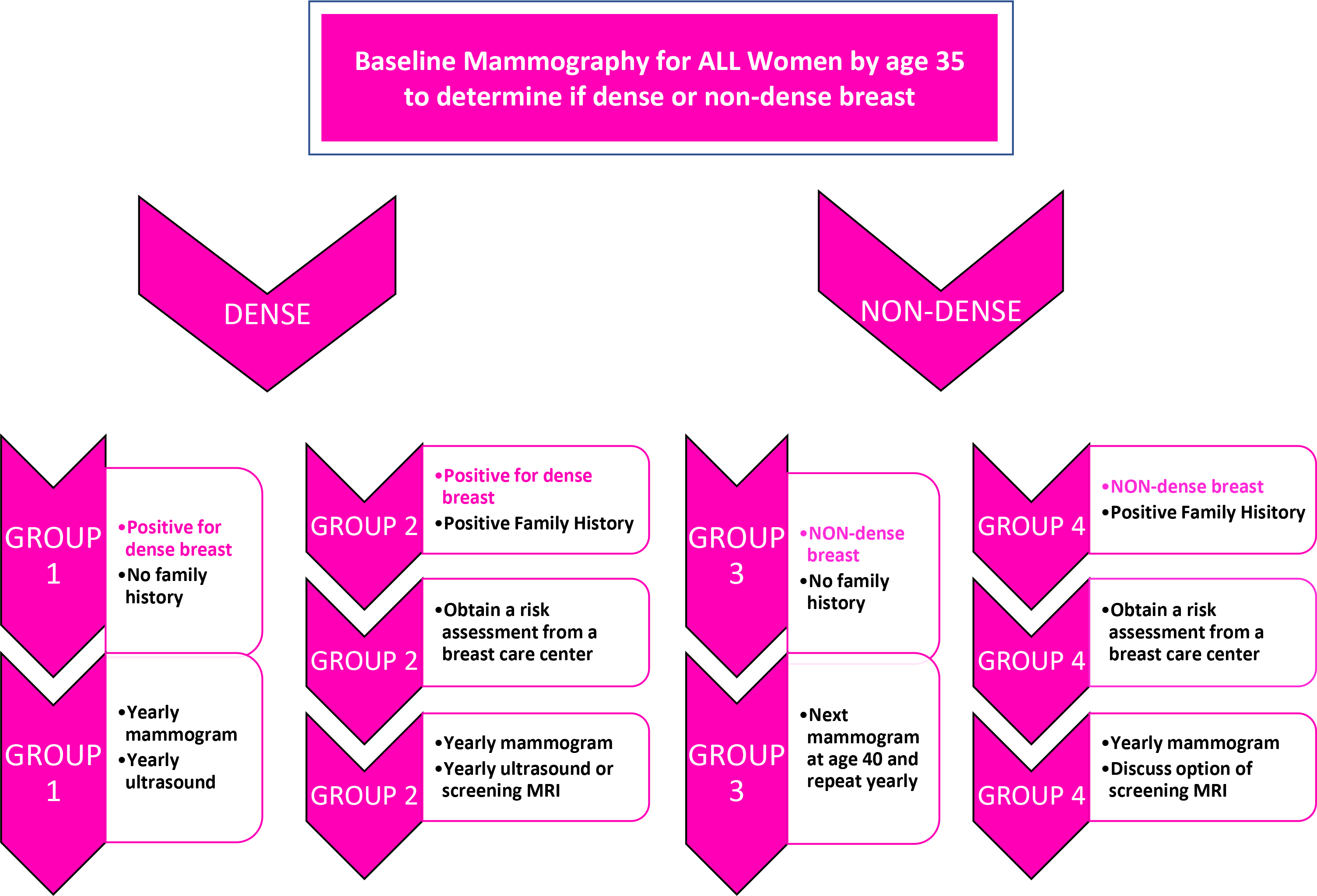Early Detection
Breast Cancer Imaging
Our Breast Screening Guidelines
Current guidelines recommend women start screening at age 40 or older. Recent studies have concluded that some women should start screening in their 30s (ref. 1-2). The two major indications to start screening in the 30s are family history and breast density (ref. 3-4). The challenge of identifying women in their 30s who have either risk factors is twofold. First, most young women have only vague knowledge about their family history. Second, the only way to determine breast density is to do a mammogram. Breast density cannot be determined by doing self-examination or clinical examine by a physician. The only way density can be determined is by doing a mammogram.
We are convinced that the most effective strategy for reducing breast cancer mortality in young women is to start screening mammography by age 35. The rationale to start screening women in this age group is that we now have new technology, including 3-d mammography, screening ultrasound and screening MRI that can detect small breast cancers that are not detectable using standard 2-d mammography (5-8). To take advantage of the new advances in imaging technology, we recommend all women have a baseline 3-d mammogram by the age 35. The exception, is women whose mother or sisters were diagnosed with breast cancer before the age 45, would start screening ten years earlier than for average risk women. For example, if the mother was diagnosed at 43 the daughter would be advised to start screening at age 33.
Group 1
Women with dense breasts on baseline mammogram and no family history of breast cancer (Ref. 1-3 and Breast Density):
- Baseline 3D mammogram at age 35 and repeat it yearly (Ref. 4).
- A yearly screening ultrasound is also recommended (Ref 5.).
Group 2
Women with dense breasts and a family history of breast cancer
- Baseline 3D mammogram and age 35 and continue yearly screening if in good health (Ref. 6 and Risk Assessment).
- Yearly MRI in addition to yearly screening mammogram (Ref. 7)
Group 3
Women with non-dense breasts pattern on the mammogram and no family history
- These women can postpone their next yearly mammogram to age 40.
- These women do not need additional screening with ultrasound or MRI.
Group 4
Women with non-dense breasts on her mammogram and family history of breast cancer.
- These women are advised to obtain additional information on their personal risk of developing breast cancer at a center specializing in risk assessment. If they are at increased risk, the option of an added yearly MRI maybe indicated in select cases.
References:
- Breast Cancer in Young Women (from the Cleveland clinic)
https://my.clevelandclinic.org/health/articles/16805-breast-cancer-in-young-women - Some Women Should Start Mammograms at 30
https://www.webmd.com/women/news/20181128/study-some-women-should-start-mammograms-at-30 - Dense breast tissue: What it means to have dense breasts
https://www.mayoclinic.org/tests-procedures/mammogram/in-depth/dense-breast-tissue/art-20123968 - 3D mammogram – Mayo Clinic
https://www.mayoclinic.org/tests-procedures/3d-mammogram/about/pac-20438708 - The Role of Ultrasound in Screening Dense Breasts—A Review of the Literature and Practical Solutions for Implementation
https://www.ncbi.nlm.nih.gov/pmc/articles/PMC5872003/ - Family History
https://www.breastcancer.org/risk/factors/family_history - Supplemental MRI Screening May Benefit Women with Extremely Dense Breasts
https://www.breastcancer.org/research-news/supplemental-mri-benefits-extremely-dense-breasts - Women 75 and Older Benefit from Screening Mammograms (breast cancer.org)
https://www.breastcancer.org/research-news/screening-mammos-benefit-women-75-and-older - BRCA Gene Mutations: Cancer Risk and Genetic Testing
https://www.cancer.gov/about-cancer/causes-prevention/genetics/brca-fact-sheet
What age to stop screening:
Although most current screening guidelines recommend women stop screening at age 75, a recent publication provided a rationale for healthy women with dense breasts to continue yearly screening as long they remain in good health (Ref. 8).
Women at Very High Risk:
Women with a known high-risk mutation such as women with a BRCA1/2 mutation or women with a history of chest wall radiation, should undergo risk assessment as soon as their breasts develop. These women should be followed in a high-risk clinic and have more aggressive screening (Ref. 9).
Donate
Today
Your donation supports our mission to provide breast cancer education to EVERY woman.
